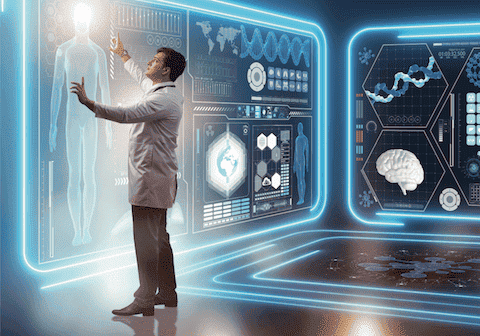How AI & ML are helping in efficient healthcare management?
Artificial Intelligence (AI) and Machine Learning (ML) are revolutionizing the healthcare industry by enhancing efficiency, accuracy, and patient care. These technologies are transforming various aspects of healthcare management, from patient data management to clinical decision support. Here’s how AI and ML are making significant strides inefficient healthcare management.
☆ Enhancing EMR Software and EHR Systems
Electronic Medical Records (EMR software) and Electronic Health Records (EHR software) are fundamental to modern healthcare technology. AI and ML enhance these systems by providing predictive analytics, which help in early diagnosis and personalized treatment plans. For example, AI algorithms can analyze patient data to predict potential health issues, enabling proactive intervention. This is especially beneficial for specialized fields such as ophthalmic software in eye clinics and eye hospitals, where precise data analysis can significantly improve patient outcomes.
☆ Streamlining Queue Management
Long waiting times are a common issue in healthcare facilities. AI-powered queue management systems can analyze patient flow and optimize scheduling to reduce wait times. These systems can predict peak hours and adjust resources accordingly, ensuring smooth operations and improved patient experience.
☆ Improving Practice Management
AI and ML technologies streamline practice management by automating administrative tasks, managing patient records, and optimizing scheduling. These solutions help healthcare providers focus more on patient care and less on paperwork, leading to a more efficient practice.
☆ Addressing EMR Problems
Many healthcare providers face challenges with EMR systems, such as data entry errors and interoperability issues. AI-powered solutions can address these EMR problems by automating data entry, ensuring data accuracy, and enhancing system integration. This leads to better patient data management and overall healthcare workflow.
☆ Leveraging Healthcare Technology for Paperless Solutions
AI and ML facilitate the shift towards paperless solutions in healthcare by digitizing patient records, prescriptions, and other documents. This not only improves efficiency but also enhances data privacy and reduces the risk of errors associated with manual record-keeping.
☆ Integrating WhatsApp and Healthcare APIs
WhatsApp integration and healthcare APIs are transforming patient communication and engagement. AI-driven chatbots can provide 24/7 support, answer patient queries, and schedule appointments. These integrations enhance patient experience and streamline communication between patients and healthcare providers.
☆ Automating Pharmacy Operations
Pharmacy automation using AI and ML improves inventory control, prescription digitization, and overall pharmacy operations. These technologies ensure accurate medication dispensing, reduce errors, and enhance patient safety.
☆ Enhancing the Healthcare Industry with Digital Transformation
AI and ML are driving digital transformation in the healthcare industry by enhancing data analytics, patient care, and operational efficiency. From remote patient monitoring to virtual consultations, these technologies are reshaping how healthcare services are delivered.
☆ Improving Patient Experience
AI-powered solutions enhance the patient experience by providing personalized care, reducing wait times, and improving communication. AI can analyze patient feedback to identify areas for improvement and tailor services to meet patient needs.
☆ Ensuring Data Privacy with Cloud-Based Solutions
Cloud-based solutions provide secure and scalable platforms for storing and managing patient data. AI and ML enhance data privacy by implementing advanced security measures and ensuring compliance with healthcare regulations.
☆ Facilitating Remote Patient Monitoring and Virtual Consultations
Remote patient monitoring and virtual consultations are becoming increasingly popular, especially in the wake of the COVID-19 pandemic. AI and ML enable these services by providing real-time data analysis and facilitating seamless communication between patients and healthcare providers.
☆ Supporting Clinical Decision Making
AI and ML provide clinical decision support by analyzing patient data and offering evidence-based recommendations. This enhances the accuracy of diagnoses and treatment plans, leading to better patient outcomes.
☆ Optimizing Pharmacy and Inventory Control
AI technologies optimize pharmacy operations and inventory control by predicting demand, managing stock levels, and automating order processes. This ensures that medications are always available and reduces wastage.
☆ Streamlining Revenue Management
AI and ML streamline revenue management by automating billing processes, reducing errors, and improving financial planning. These technologies enhance the financial health of healthcare institutions by ensuring accurate and timely payments.
☆ Implementing Healthcare Automation
Healthcare automation using AI and ML enhances operational efficiency, reduces administrative burdens, and improves patient care. Automated systems handle tasks such as scheduling, billing, and patient communication, freeing up healthcare providers to focus on clinical tasks.
☆ Integrating Healthcare Systems
AI facilitates healthcare integration by ensuring seamless communication and data exchange between different systems. Health Information Exchange (HIE) and integrated healthcare software solutions improve care coordination and patient outcomes.
☆ Enhancing Healthcare Workflow
AI and ML optimize healthcare workflow by automating routine tasks, managing patient data, and providing decision support. This leads to more efficient operations and better patient care.
☆ Improving Patient Communication
AI-powered tools enhance patient communication by providing real-time support, personalized interactions, and efficient appointment scheduling. These tools improve patient satisfaction and engagement.
☆ Overcoming Healthcare IT Challenges
AI and ML address various healthcare IT challenges, such as data interoperability, cybersecurity, and system integration. These technologies enhance the reliability and efficiency of healthcare IT systems.
☆ Leveraging Healthcare Analytics
AI-driven healthcare analytics provide valuable insights into patient data, operational efficiency, and treatment outcomes. These insights help healthcare providers make informed decisions and improve patient care.
☆ Ensuring Healthcare Compliance
AI technologies ensure healthcare complianceby automating documentation, tracking regulatory changes, and implementing security measures. This reduces the risk of non-compliance and enhances data security.
☆ Expanding Telehealth Services
Telehealth services powered by AI and ML offer convenient and accessible healthcare options for patients. These services include virtual consultations, remote monitoring, and digital health assessments, improving access to care and patient satisfaction.
☆ Conclusion
AI and ML are transforming healthcare management by enhancing efficiency, accuracy, and patient care. From optimizing EMR software and EHR software to improving queue management and practice management, these technologies are revolutionizing healthcare operations. Integrating AI-powered solutions ensures better patient experience, streamlined operations, and enhanced data privacy. As the healthcare industry continues to evolve, AI and ML will play an increasingly crucial role in shaping the future of healthcare management.

